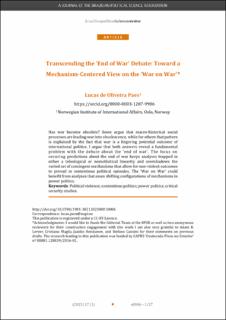| dc.contributor.author | Paes, Lucas De Oliveira | |
| dc.date.accessioned | 2023-07-24T09:12:44Z | |
| dc.date.available | 2023-07-24T09:12:44Z | |
| dc.date.created | 2023-05-02T10:21:16Z | |
| dc.date.issued | 2023 | |
| dc.identifier.issn | 1981-3821 | |
| dc.identifier.uri | https://hdl.handle.net/11250/3081060 | |
| dc.description.abstract | Has war become obsolete? Some argue that macro-historical social processes are leading war into obsolescence, while for others that pattern is explained by the fact that war is a lingering potential outcome of international politics. I argue that both answers reveal a fundamental problem with the debate about the ‘end of war’. The focus on securing predictions about the end of war keeps analyses trapped in either a teleological or nomothetical linearity and overshadows the varied set of contingent mechanisms that allow for non-violent outcomes to prevail in contentious political episodes. The ‘War on War’ could benefit from analyses that asses shifting configurations of mechanisms in power politics. | |
| dc.description.abstract | Transcending the ‘End of War’ Debate: Toward a Mechanism-Centered View on the ‘War on War' | |
| dc.language.iso | eng | en_US |
| dc.rights | Navngivelse 4.0 Internasjonal | * |
| dc.rights.uri | http://creativecommons.org/licenses/by/4.0/deed.no | * |
| dc.title | Transcending the ‘End of War’ Debate: Toward a Mechanism-Centered View on the ‘War on War' | en_US |
| dc.title.alternative | Transcending the ‘End of War’ Debate: Toward a Mechanism-Centered View on the ‘War on War' | en_US |
| dc.type | Peer reviewed | en_US |
| dc.type | Journal article | en_US |
| dc.description.version | publishedVersion | |
| dc.source.journal | Brazilian Political Science Review | en_US |
| dc.identifier.doi | 10.1590/1981-3821202300010006 | |
| dc.identifier.cristin | 2144630 | |
| cristin.ispublished | true | |
| cristin.fulltext | original | |
| cristin.qualitycode | 1 | |

